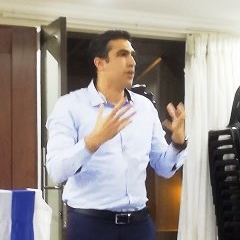click to dowload our latest edition
CLICK HERE TO SUBSCRIBE TO OUR NEWSLETTER


Published
5 years agoon
By
adminJORDAN MOSHE
Addressing an audience at Keter Eliyahu shul in Johannesburg on Monday evening, he said that 70 years after its birth, the state of Israel has passed through childhood and entered the teenage years. Like any angst-ridden adolescent, it is trying to define who it is.
Chetboun said that the values which have defined Israel since its establishment are being questioned and challenged. “Public figures don’t speak about security or politics in Israel these days,” he said, “Instead, they ask who we are as Israelis, and how we identify ourselves.”
Today an infantry battalion commander in the reserves, Chetboun comes from a background of governance and diplomacy, planning and managing numerous projects with government ministries, local authorities, companies, and public institutions. A decorated veteran of the second Lebanon War of 2006, he was part of the Israeli Defense Forces operation in the Lebanese village of Bint Jbeil in which Major Roi Klein lost his life.
This harrowing ordeal framed his talk. Leading a platoon of 70 soldiers into the village to eliminate Hezbollah operatives, Chetboun experienced a moment which remains with him to this day. “I was 500m away from Roi Klein when he jumped onto a grenade, and sacrificed his life for several others. I knew what happened because I heard someone say ‘Roi is dead’ in my earpiece. It was Roi himself who relayed the message in his final moments, because he was a senior commander who knew someone would have to take his place. Even seconds before he died, that was his priority.”
In spite of coming under heavy fire, Chetboun and his men moved in to remove the bodies of Klein and other soldiers from an olive grove in the village. The gravity of the scene before him struck him only years later, he says. “The seven individuals I saw fallen in front of me represented the entire Jewish people,” says Chetboun. “Sephardi, Ashkenazi, religious, secular, they were all there. I saw the nation of Israel on the ground in that olive grove.”
Reflecting on the experience, he explained that this sense of unity characterised not only Jews, but the state of Israel. “No matter how religious or political one is,” he said, “one has his place in the country. Yes, we may disagree and shout, but we are not a divided population.”
This sense of unity has empowered the state to take on any conflict so far. Chetboun said that throughout Israel’s history, the enemy was clearly defined and engaged with by a united population. “Arab states with clear goals allied themselves against us,” he says. “We went to war with a state, be it Egypt, Lebanon, or any other. In the past decade, the situation has changed, and we find ourselves caught between the two sides of the Islamic world as they fight for domination.
“With Iran seeking to lead the Shi’ite side, and Turkey the Sunni, Israel has had to contend with terror organisations acting with the support of either side. With so many players and interests involved, the threat against Israel has changed completely, and is more complicated than ever before.”
However, in spite of the complexity of this situation, security is no longer Israel’s most pressing concern. It is an ongoing concern, but it is no longer the burning issue which occupies politics and the media. The question of identity has taken its place, and will even define the upcoming April election.
Said Chetboun, “For the past few decades, conflicts and development have been pressing concerns that have drawn the population together. After 70 years of discussion about security, the subject has changed, and we are now considering what sort of a state it is. No longer divided by left or right of the political spectrum, the population is now clashing over whether the state should be guided by religious or civil values.
“Benny Gantz doesn’t speak about safety anymore. Instead, he asks whether public transport should be allowed to operate on Shabbat. Yair Lapid is discussing what would happen if Judaism was disconnected from Israel as a state. Not even the left is concerned with land or security anymore. The order of the day is the clash of traditionalist and modernists, with the role of Jewish identity in the spotlight. This split will dominate the elections, not politics.”
It is now that Israel’s defining sense of unity is being challenged, that it has become more important than ever. Citing a survey, Chetboun highlighted the fact that while they might not consider themselves religious, 85% of Israelis see themselves as believers at some level. “They all feel Jewish in some way,” he said. “The values and ideologies which have defined Israeli society, family life, and way of life, which have held everyone together until now, are being questioned and evaluated by those who want the country to move away from being a Jewish state. The impact would be dangerous and divisive.”
Although he believes this development is normal for any young state, Chetboun fears that the unity which has enabled the Jewish people and the state to succeed against all odds is at risk, and must therefore be defended at all costs. “The unity of the Jewish people is more important than ever before,” he says. “Whether one is religious or not, the source of the traditional values which have defined Israeli society until today are drawn from Judaism, and those who are defending it as a base of tradition are up against a side which wants that to change.
“The outcome of this clash will determine Israel’s identity. It will affect everything from the election to our way of life. The unity which has defined the Jewish people is at risk, and the Israeli public will determine the future of Israeli society.”
